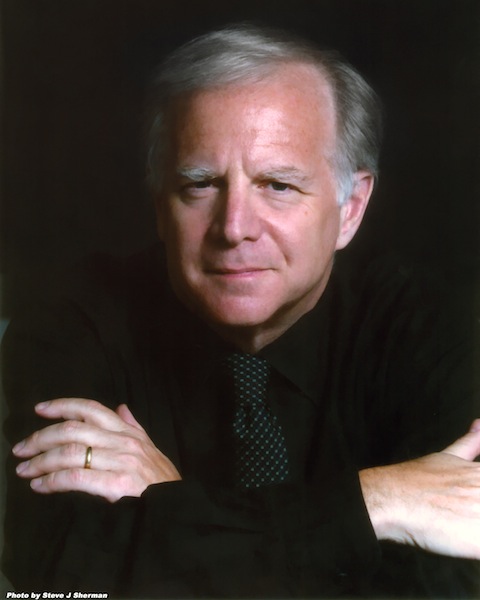Two stars and imaginative fare light up Orchestre National de Lyon concert

Leonard Slatkin conducted the Orchestre National de Lyon Monday night at Carnegie Hall.
Leonard Slatkin has a reputation for off-the-radar programming, and that was made strikingly evident in his Carnegie Hall appearance with the Orchestre National de Lyon, for which he has served as music director since 2011.
In 1910, Maurice Ravel was commissioned to write Antar, a suite based on Rimsky-Korsakov’s Symphony No. 2 (“Antar”) and other music, but Ravel’s score was never published and lay dormant, until the Lyon ensemble decided to resurrect it in 2014. But they went further, in effect creating a new piece by adding commissioned text from Amin Maalouf, noted for his libretti for Kaija Saariaho’s operas. Fleshing out the desert travels of Ravel’s title character, Maalouf explained in the program notes, “The warrior-poet Antar and his beloved Abla are, in a way, the Romeo and Juliet of the Arab world. Everyone knows their story.” Slatkin and the musicians presented the result, for orchestra and narrator, in a 2016 English translation by Matthew Hurt and Sarah Vermande.
Of course, it doesn’t hurt if said narrator is Thomas Hampson—a shrewd choice, since his boldly present singing voice is complemented by an equally boldly present speaking one. Slight amplification, expertly done—coupled with his impressive diction and projection—helped him ride just a few notches above the orchestra, as if he were the perfect bedtime-story-reader.
As might be imagined, the score sounds more like Rimsky-Korsakov, albeit through Ravel’s prism, and is filled with stirring orchestral sequences. Glimpses of Scheherazade flit in and out of focus, with voluptuous stretches for the Lyon strings. Concertmaster Jennifer Gilbert (sister of Alan Gilbert, who was in attendance) played enticingly in her solo passages, as did principal cellist Nicolas Hartmann.

Renée Fleming
For many, the night’s other draw was soprano Renée Fleming, whose appearances at this point have to be treasured. It’s difficult to grasp that her voice has diminished in recent years, when it seems like yesterday when she was soaring over the Met Orchestra or other world-class ensembles. (She will likely be poignant as the Marschallin in the Met’s new production of Der Rosenkavalier, which opens in April.)
But Ravel’s Shéhérazade (1903) made a fine choice, especially in this context. If Fleming’s French diction at times seemed to melt syllables into each other, never mind: the tone and phrasing were still intact, and she captured the composer’s dreamlike haze, supported by luxurious pillows of sound from the Lyon musicians. Principal flutist Jocelyn Aubrun offered a magical line in the second of the three songs, “La Flûte enchantée.”
Slatkin added yet another fascination: the U.S. premiere of Celephaïs (2016) by Guillaume Connesson, a composer living in Paris. The title is based on an outlier source: a dreamlike city created in the 1920s by horror writer H.P. Lovecraft. Connesson’s brief tone poem, with sections such as “The Turquoise Temple” and “The Rose-crystal Palace of the Seventy Delights,” is sumptuously conceived for a large orchestra, tinged with jazz and exotic percussion, and filled with cinematic climaxes. Placed in the middle of this program, it would have equal impact as a concert opener, and deserves wide exposure.
The program proper closed with more Ravel, his Suite No. 2 from Daphnis et Chloé, and the effort from Slatkin and the musicians made one wish the orchestra had brought the entire score, with chorus. Still, twenty minutes of Daphnis is better than no Daphnis, and produced a commensurate ovation.
But the conductor still had several tricks up his sleeve, one in particular. Slatkin cheerily announced, “We have two pieces to play for you. One is the Barcarolle from Offenbach’s Tales of Hoffmann. The other isn’t.” And though the Offenbach was sensitively done, again showing off the sheen of the orchestra’s strings, the second encore brought down the house. Composed by Felix Slatkin, the conductor’s father, Carmen’s Hoedown (1962) is a crazy fusion of Bizet with a traditional American barn dance, and a bit of Spike Jones thrown in for good measure. The result showed off the ensemble’s percussion crew, who made liberal and hilarious use of a wooden clapper, slide whistle, and a washboard, in addition to tuba player Guillaume Dionnet, delivering a very American-sounding “Yee-haw!”
Posted Mar 23, 2017 at 10:01 am by Peter GOSZTONYI
Emmanuel Krivine has been Artistic Director of Orchestre National de Lyon during 13 years (1987- 2000). Under the baton of Maestro Krivine this orchestra riched a high musical quality.
Leonard Slatkin brings Lyon’s public several high level concerts from works of American composers.
He added a great value to Lyon city.